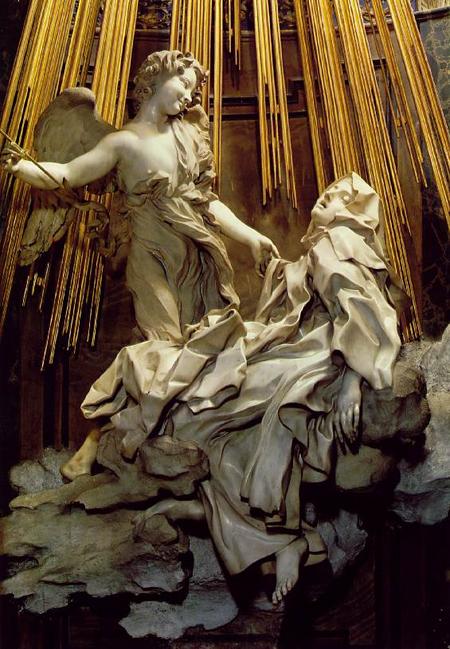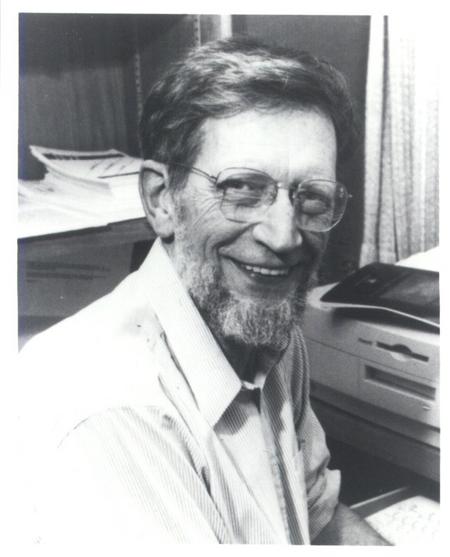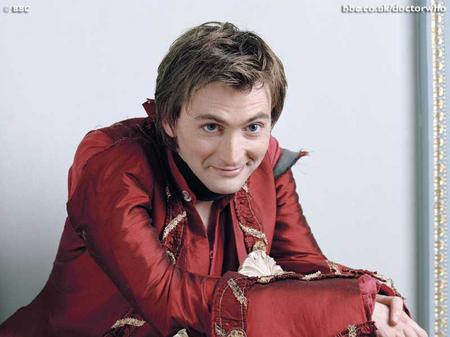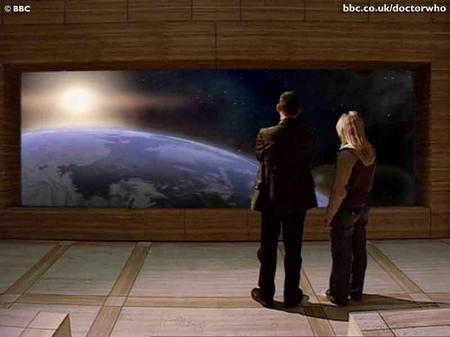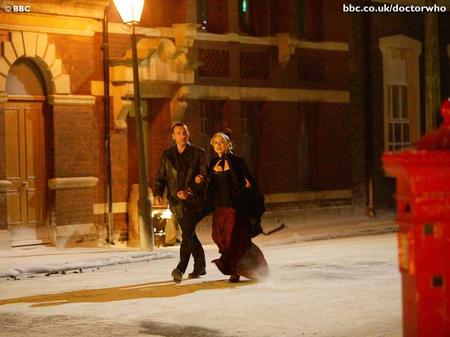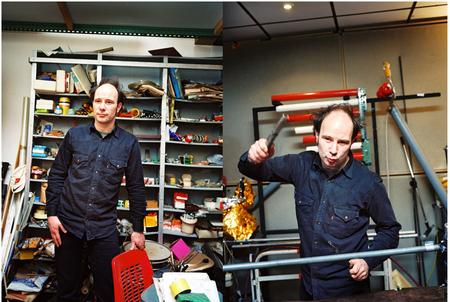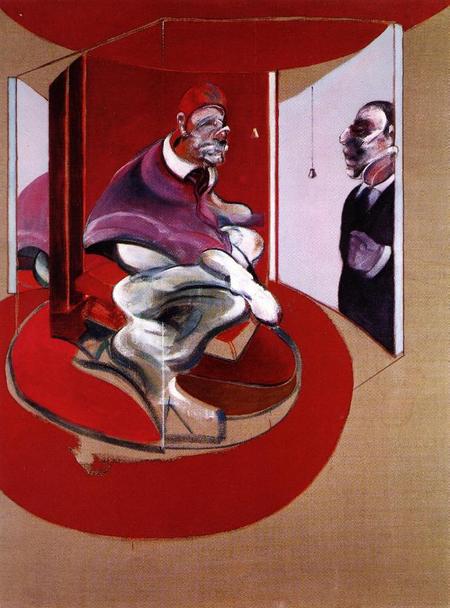April 27, 2005
It's either Spinoza, or Hegel, or nothing
OK: so while I enjoy the oldstyle inter-blog response and counter-response thing, I think the discussion developing between k-punk and Infinite Thought would be better conducted on Dissensus. So my response to Infinite's latest post on non-theism can be found here.
Meanwhile:
looking forward to the Blissblogga's evening at the Boogaloo tonight (it goes without saying that I'm enormously enjoying the book). Hope to see some of you there.
April 26, 2005
Substance is not one

Infinite Thought responds to my call for a 'naturalistic religion'. This seems like a classic case of something that should be 'taken to Dissensus', but for now:
1. There are different senses of naturalism, but some of then CAN be equated with materialism. The point of the Spinozist insistence on Nature is to deny any space for theism by radically refusing any possibility of the supernatural. Contra Plantinga's 'weaselism', I would say that science does commit one to this kind of naturalism. But to say that God is Nature is not to suggest that there is a determining (i.e. Personal) entity which is Nature; that would be to re-introduce transcendence.
2. Lacan's and Zizek's anti-naturalism might be better construed as an anti-naturalization: i.e. surely they are naturalistic in the sense that they refuse the supernatural, but at the same time they want to deny that the particular semiotic regime arising from a particular take on human physiology is 'natural' as in (1) inevitable and (2) ethically and epistemologically 'correct'. But the very point of Spinoza's naturalism (contra Aquinas' supernaturalism) is that nothing is more natural than anything else. In fact, it is only via Spinozistic naturalism that the word 'natural' can be evacuated of any possible sense: natural as opposed to what?
3. To be clear, then: the naturalism I call for is to be understood in two ways (1) as a total refusal of the supernatural and (2) an assertion of determinism. Again, though, it has to be made clear that there is no Nature which causes anything: rather Nature is the network of causes and effects that will have been the case.
4. Badiou's attack on Spinoza. I may be misunderstanding this, but it seems to rest on a conflation of two claims: 'there is only one substance' and 'substance is One'. Spinozist monism differs from Neo-Platonist accounts of God by refusing the second claim, which again would involve making a space for transcendence. The claim that there is nothing outside or apart from Nature doesn't entail any commitment to the view there is a quality, 'oneness', which Nature possesses. On the contrary, in fact. Subtracting transcendence and denying the supernatural is precisely a subtraction of the 1 (n-1): it leads to the zero of the body without organs, not the One of the body with organ.
5. The claim that 'Thought is radically disjunct from any naturalistic account thereof' is susceptible to many interpretations (in part because of the ambiguities in the meaning of 'naturalism', as gestured to above) but I can't come up with one that isn't crypto-idealist. The over-rating of the importance of thought (as opposed to practice) in Badiou, the flirtation with the idea that thought is somehow independent of any material substrate (what IS his philosophy of mind any how?) seem to me vices of Badiou's philosophy, not strengths. The attack on Spinoza's 'closed ontology' stems from a similar weakness in my view, but this time it is Badiou's voluntarism and crypto-phenomeonology that is the problem. What seems to be being refused here is Spinoza's distinction between how things are 'under the aspect of eternity' and how they appear in lived duration. Badiou is no friend of lived duration, but it is only at this level, it seems to me, that there can be anything that looks like 'breaks' or disjunctions.
6. The idea that religion is always about meaning is question-begging. Of course, I would want to make an opposing claim: any refusal of monism is effectively an advocacy of theism. The only way to destroy theism is to reject all forms of transcendence, personalism, and dualism. Thus Theism might always be about meaning, but what religion would look like if monism were asserted AGAINST theism is an open question.
April 24, 2005
Theism now
To Reading, then, with Infinite Thought, for a conference on 'The Meaning of Theism'. (Reading: the very model of 'the typical provincial British town', cored-out, dessicated, an anonymous hosting surface for the dull brightness of Capital's semiotic pollution, a non-place without even the memory of character.)
According to Anthony Kenny, you can tell whether a philosophy of religion specialist is a believer or not by their neckwear. Believers wear ties wheareas unbelievers go tieless. The speakers at yesterday's conference conformed to type: Kenny himself - a not-quite believer and self-professed 'agnostic' - and dull secular-humanist Richard Norman went without ties; committed theists John Haldane and Alvin Plantinga wore them.
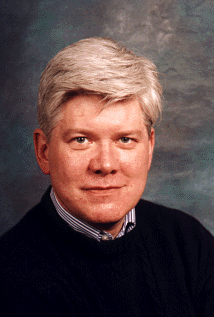
Haldane has an insouciantly persuasive manner, complete with alpha male body posture, the authentic accent of modern British power (a gentle Scottish burr) and a grimace-smile tic that makes me imagine him being effective as a state torturer. He began his paper, 'Religion and the Restless Heart', by enthusiastically heralding Ratzinger, which is hardly surprising: if ever there were a Pope for Catholic intellectuals, it is Benedict XVI who - whatever else he might be - is a theologian of fearsome intelligence and learning. He ended his presentation by openly affiriming what he himself characterised as a non (if not quite anti) democratic, elitist conception of divine illumination.
Haldane was clear that the 'meaning of theism' involves the commitment to a personal god who freely chooses to create the world. The divine attribute of being 'creator and sustainer of the univese' is, then, contingent, unlike such other qualities such as 'omnipotence' and 'perfect goodness'. That is to say, for the theist it is unimaginable that God not be omnipotent, perfectly good etc, but it is possible to concieve God as not having created the world. From the side of the created, however, the relationship is necessary, not contingent: our existence depends upon the necessary being, God. Hence neo-Platonist claims that the world emanates from God, that God's love necessarily expresses itself in creation, that all beings are a modifications of a single Being, cannot be right. The creation of the world is an act of volition by a personal entity.
Haldane then argued that philosophical thought is periodically haunted by a 'return of the repressed'. Certain styles of argument never go away, they lurk in some subdued place before resuming their dominance. A repressed that is returning now is the idea that philosophy should be about wisdom. Perhaps the Stoics were the first to articulate this, in their opposition between practice and discourse, their claim that philosophy should be about 'forming a demeanour' which is answerable to metaphysics. In modern times, the call for an end to philosophy in activity was made most forcefully by existentialism which, after years of neglect and quiet derision, is now making its return. He argues that philosophy is 'completed' by religion; that philosophy is unfinished whilst it remains only contemplative.
This set up the main theme of Haldane's paper: how does humanity's existential plight - its restless yearning and feeling of homelessness - relate to religion? Is there some innate impulse in human beings to believe in God?
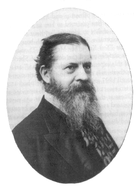
Haldane referred to two arguments which claimed that there is in fact such an impulse: Peirce's 'neglected argument' and C. S. Lewis's argument from desire. Deliberately echoing the Kant of 'The Critique of Teleological Judgement', Peirce reasons that:
" … there is a reason, an interpretation, a logic in the course of scientific advance, and this indisputably proves to him who has perceptions of rational or significant relations, that man's mind must have been attuned to the truth of things in order to discover what he has discovered. It is the very bedrock of logical truth."
In other words, "unless man has a natural bent in accordance with nature's, he has no chance of understanding nature at all." Our 'attunement' to nature evidenced through "the discoveries of science, their enabling us to predict what will be the course of nature, is proof conclusive that though we cannot think any thought of God's, we can catch a fragment of his Thought, as it were."
Lewis, meanwhile, argued that people want, and know they want, something they cannot find in the world. Since there are satisfactions available for other, more banal, desires (the desire for food, or sex, for instance), there must also be a possible relief for this existential ache - but not in this world. Hence human beings must have been made for another world.
Now, as Haldane readily conceded, it is clear that not every desire has an objective correlate: for example, the human desire to fly must remain, for the moment at least, unsatisfied. Thus Lewis is forced to argue that the desire for existential completion is in some sense a 'natural' rather than an 'artificial' desire, that it is innate rather than acquired, spontaneously-occurring rather than cultivated, non-eliminable rather than eliminable.
(The assumption that desire implies a possible satisfaction will raise the hackles of anyone keyed into pyschoanalysis, which, of course, insists that desire entails the impossibility of any satisfaction. In On Belief, Zizek in effect counters Lewis's argument (and Haldane's re-presentation of it) with his invocation of the existential Heidegger. Zizek is concerned to refute 'the notion that there is a home, a "natural" place for man: either this world of the "noosphere" from which we fell into this world and for which our souls long, or Earth itself. Heidegger points the way out of this predicament: what if we effectively are "thrown" into this world, never fully at home in it, always dislocated, "out of joint," and what if this dislocation is our constitutive, primordial condition, the very horizon of our being? What if there is no previous "home" out of which we were thrown into the world, what if this very dis-location ground man's ex-static opening to the world?' (9) )
Satisfied that he had established that arguments like Peirce's and Lewis's offer intimations of 'our transcendent source and destiny', Haldane (re)turned to Aquinas to answer the question: is there an innate desire in human beings for the beatific vision? Haldane noted that this is a source of dispute within Thomism, but ultimately took the view that, while there is a desire for knowledge common to all human beings, there is no universal desire for God. The desire for knowledge must be taken through the 'traditional' argumetnts for the existence of God - the ontological, cosmological and teleologial 'proofs'. Once it is established that God is, there is then a yearning to know what God is. Divine llumination is available to all, but some 'intellects' will be 'better-trained', more able to 'see' and appreciate the Divine nature.
Thus Haldane wanted to contain desire within knowledge. This, and his talk of 'completion', will inevitably put the Lacanian in mind of Seminar XX and Lacan's bid to 'interpret one face of the Other, the God face, as based on feminine jouissance'. But such jouissance - 'a jouissance that is hers, that belongs to that "she" that doesn't exist and doesn't signify anything' - is famously opposed to knowledge ('woman knows nothing of this jouissance'). If God is not all, but the not-all (uttunul), then God cannot be known, not merely contingently (it is not that there is a God that can be known, but beings such as us are not capable of attaining such knowledge) but necessarily (God is that which lies beyond 'knowledge', not only beyond knowability). As ever, we can rely upon Zizek for a succinct and lucid account of this knotted logic:
'even when it is "all", complete with no exception, the field of knowledge remains, in a way, non-all, incomplete - love is not an exception to an All of knowledge, but precisely that "nothing" which makes incomplete even the complete series/ field of knowledge. In other words, the point of the claim that, even if I were to possess all knowledge, without love, I would be nothing, is not simply that with love I am "something" - in love, I am also nothing but, as it were, a Nothing humbly aware of itself, a Nothing paradoxically made rich through the very awareness of its lack.
Only a lacking, vulnerable being is capable of love: the ultimate mystery of love, therefore, is that incompleteness is in a way higher than completion. On the other hand, only an imperfect, lacking being loves: we love because we do not know all. On the other hand, even if we were to know everything, love would, inexplicably, still be higher than completed knowledge.' (The Puppet and the Dwarf, 115)
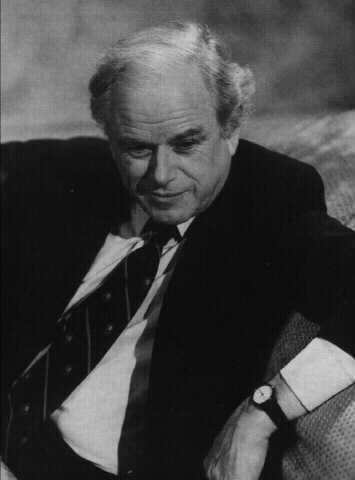
The 'agnosticism' advocated in Anthony Kenny's paper was in some respects similar to Lacan-Zizek's non-theism. But ultimately his God is simply unknown, whereas theirs is beyond knowledge.
When Kenny speaks, you think of long, balmy evenings drinking red wine on the lawn in Oxford. Kenny, a former Catholic priest turned anti-theist if not atheist, argued that God is inconceivable. Although he was at pains to distinguish inconceivablity from inconsistency (God is inconceivable without being logically inconsistent), it was not always clear what Kenny, in a reversal of the ontological argument, was saying was that cannot be conceived: 'God', the concept, or God, the actually existent but unknowable entity. Kenny wanted to say the former, but, implictly if not explicity, didn't do so consistently. For instance, he claimed that God has no behaviour like the behaviour of human beings or their creations. But if God were a genuinely inconceivable concept, then surely even that is saying too much.
The nub of Kenny's argument was his claim that it is impossible to speak literally about God because God does not belong to a language game. Any sentence in which 'God' appears has an irreducibly metaphorical content. Thus Kenny's position on religious language is literally equivocal: it is impossible to speak univocally about God, but it is not only that any language about God is analogical - it is also that the concept of God itself is analogical too.
Kenny called upon two scholastic sources in support of that position: John Scotus Eriugena and Nicolas of Cusa. Eriugena argued that God does not belong to any of Aristotle's categories, so that not only the ascription of anthropomorphic predicates but even the ascription of more abstract predicates such as 'just' and 'good' was metaphorical. Affirmative theology - theology which claims that God can be described - is not the opposite of negative theology, since even negative theology says too much. God is more than God.
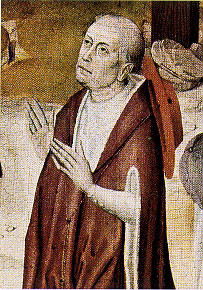
In a kind of pre-echo of Kant and Wittgenstein, Nicolas of Cusa argued that wisdom consists in an awareness of the limits of one's knowledge. God lies beyond possible knowledge, graspable only as a paradoxical 'coincidence of opposites'. God might, as Anselm said, be the greatest conceivable being, but he is also that which nothing lesser can be conceived. God no more is than is not. So Cusa calls for a sacred, rather than a brute, ignorance.
Kenny concluded with a reference to two more recent figures: the Dominican priest Herbert McCabe and the believer-turned-agnostic poet A. H. Clough. Kenny focused on McCabe's argument on prayer. Since it is obvious that God cannot answer all prayers (because good people want incompatible things), the honest believer must accept that petitionary prayer is a waste of time. But it is precisely as a waste of time that prayer should be valued. The time we most value, McCabe argued, i.e. time spent with a loved one 'doing nothing', is after all, wasted time. Kenny made McCabe's position here sound remarkably Bataillie-like: better even than play, prayer removes the believer from the production and creation-fixated business of the profane world.
(Weberian Protestants in this respect at least, Infinite Thought and I were unconvinced by this call to indolence and disengagement.)
In the end, Kenny's position, with its preoccupation with the limits of knowledge and its attempt to come to terms with the 'disenchantment of the world' seemed very twentieth century.
Richard Norman's 'The Varieties of Non-Religious Experience' is best glossed over quickly. Suffice it to say, the dreary lameness of Norman's secular humanism was the best advert for theism all day. His argument - that there are atheist substitutes for of all of the experiences that might be thought of as uniquely religious and therefore that the secular humanist is missing nothing - was the theological equivalent of a vegetarian sausage. Surely humanism can do better than offer a pathetic, taste-free version of the numinous?
Alvin Plantinga, however, provided all the entertainment his work - a bizarre mixture of Reformation theology and analytic philosophy, like commonsense warped through a Philip K Dick scanner darkly - promised. Plantinga looks like an Amish elder and has a rounded, stentorian speaking voice reminiscent of the Simpsons' Principal Skinner. His stock-in-trade is a kind of theo-philosophical science fiction, in which the absurd thought experiments of analytic philosophy are used to bolster theism at its most preposterous.
Plantinga's MO is basically defensive: he aims to show that the ideas that God is logically contradictory or has been disproved by science are wrong-headed. Hence his claim that it is legitimate to treat belief in God is a 'basic belief', a foundational belief that requires no further evidence, like our beliefs that other people have minds or that the world did not come into existence five minutes ago. You see, says Alvin, you can't prove those beliefs are true either, but no-one says that they are irrational. And belief in God is just like that - unprovable but rational. See also his solution to the problem of evil, the idea that the existence of an omnipotent and perfectly good being is incompatible with the presence of evil in the world. Well, Plantinga argues, God cannot create a world free of evil because of 'transworld depravity'. This gloriously SF concept is coined to show that, there will be wickedess in any world which God chooses to actualize where human beings are free, because all humans suffer from some degree of 'transworld depravity'.
Plantinga's concern yesterday was to establish that, contra certain 'misapprehensions', science has not proved that God cannot act in the world. Science, in other words, does not entail naturalism - the view that God, or any being like God, cannot exist.
The standard disenchanted view (as put by Bultmann, Macguarrie and others) has been that it is impossible for God to intervene in the world because such action would violate the principle of the 'conservation of energy'(i.e. there is only a finite amount of energy in the universe and this cannot be added to, merely transformed). Plantinga demonstrated that this objection is question-begging, since it assumes what it needs to establish, namely that the universe is a closed or isolated system. (The principle of the conservation of energy only applies to systems that are closed).
If there is no problem with 'special divine action in the world' on the old (classical) model of physics, there is, Plantinga argued, even less of an issue with the new (quantum) paradigm. Quantum theory maintains that the universe is probabliblistic rather than deterministic - miraculous events like walking on water are not impossible, just very improbable ('but we already know that,' Plantinga wryly noted).
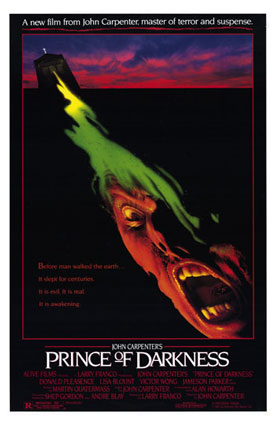
In his claim that God could be the cause of quantum 'collapses', Plantinga sounded oddly similar to the physicist in John Carpenter's Prince of Darkness who urges us to 'say goodbye to classical reality'. Needless to say, the time-bending and dream invasions in Carpenter's film herald the coming of the anti-christ, not the messiah, but the point of Prince of Darkness's anti-miracles was the same as Plantinga's miracles: the traditional naturalistic account of the universe is not adequate.
There is a wonderful scene in Prince of Darkness which Plantinga - who insisted, contra Kenny, that his language about God was very literal - would no doubt appreciate. In it, Donald Pleasance's priest confesses that the Catholic Church had been selling a lie, the comforting thought that evil is 'within us'. In fact, as the brotherhood to which Pleasance's benighted priest belongs knows, evil is a real force, independent of human beings and capable of warping what we take to be physical reality.
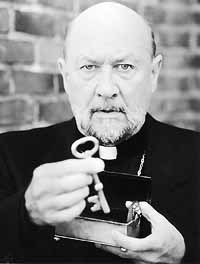
Plantinga certainly successfully routed those who assume that science means that divine intervention could not happen. But the challenge to the interventionist model has two, much stronger aspects which Plantinga did not address. The argument against miracles from Hume concerned empirical evidence - there could never be enough - not logical incompatibility. The issue is: what empirical evidence is there for the metaphysical theory of substance dualism and the related claim that there is a supernatural realm beyond the natural world? The invocation of quantum physics actually works against Plantinga here, since it suggests that, even if there are wildly improbable anomalies, these can be accounted for by entirely physical means. The hypothesis of a supernatural agent is more superfluous than ever. Quantum physics sophisticates and revises naturalism; it is not an alibi supernaturalism can use to creep back in.
The second problem is the one hinted at by Kenny but stated most powerfully by Spinoza. Logically, the idea of a personal, transcendent entity that performs miracles makes no sense.
Ultimately, it was clear from yesterday's papers that theism and its discontents remain in a kind of twentieth-century gentlemanly stand-off. Literal belief in the the personal, interventionist God who listens and acts is countered by a disenchanted assertion of secularism or by a faith that has disavowed literal belief. Within Spinoza, Lacan, Zizek and Badiou lie the philosophical resources from which a modern naturalistic religion that offers a way out of this impasse could be built. Such a religion would achieve wisdom in the sense that Haldane called for, since it would be metaphysically rigorous AND existentially committed. Time for moNONtheism....
April 21, 2005
The dictatorship of relativism (is and ought the western world)
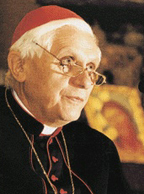
Better to be up against White Guards than Mensheviks.
With White Guards, it is at least conceded that there is a war, now, and that there is no avoiding taking sides. On Menshevik clocks, the time is always 'not yet'. Postmodernism has translated Menshevitis - its vacillations and 'critique' - into a generalized condition and pseudo-ethical injunction. 'Who are WE to judge? 'How do we KNOW...?'
It is this that accounts for Zizek's well-known ambivalence about John Paul II: at least Wojtyla resisted secular liberalism's compulsory relativism. In this light, it has been fascinating to observe the liberal press's dismay about the election of Joseph Ratzinger as the new Pope.
The fiery sermon Ratzinger delivered on Monday - the last act in his unofficial campaign for the papacy - was a fierce denunciation of what he called, delightfully, 'the dictatorship of relativism'. Now that the period of media-piety is over, hacks have allowed themselves to raise a few eyebrows about Ratzinger's (in)famous intransigence on abortion, contraception, homosexuality and women. Needless to say, the new Pope's views are not in any substantive way different from those that 'shining moral example', his predecessor, but, waking up from their hagiographic stupefaction, the hacks now find themselves (surprise, surprise) at odds with those values. Worse even than the values themselves, it seems, is their aggressive certainity with which they have been assserted.
And so last week's apparent concordat between media and church has, predictably, fallen apart with indecent haste. The (con)temporary media need for a secular saint - someone who can be 'admired' without being believed or heeded - has run aground upon Ratzinger's defiant anti-populism. Today, the Independent, not sure whether to admire or abominate the stance, reported that Ratzinger would 'rather be right than be popular'. The liberal media's assumption has been that last Pope's 'reactionary' stance on sexual ethics was 'outdated' and would 'give way' to a more 'progressive' agenda, as if it is somehow only right and proper that the church should fall into line with contemporary 'morality'. Ratzinger has absolutely refused to entertain this agenda: the church's 'ought' should not be compromised by the world's 'is'.
Ratzinger, then, has done us this service at least: he has smoked out liberalism. (Of course, Ratzinger's denunciations of abortion, contraception and homosexuality - in line with long-standing Catholic doctrine, he does not condemn the 'inclination', merely the acting upon it - have little basis in the Bible, and are noxious authoritarian supersititions, but Ratzinger is well aware that the liberal calls for church reform are effectively calls for the church to abolish itself. Catholicism without authoritarianism would be ... Protestantism.)
It is clear that liberalism does not only reject Ratzinger's brand of non-wordly values; it rejects the very concept of values that are non-consensual or extra-worldly. That is because it holds it as axiomatic that (1) all values are re-negotiable because (2) the 'word', in all its flux and impermanence, must be the ultimate arbiter of what is right. By this means, postmodern liberalism attempts to deny the legitimacy, indeed possibility, of any values at odds with the worldly. In challenging this orthodoxy, Ratzinger's dogmatism amps up the antagonism that postmodern liberalism smothers under its passive-aggressive cloak. Could this presage a war between those who continue to insist that the worldly 'is' must be judged by the standards of an offworld 'ought'?
April 17, 2005
I don't do family
Obviously I'm delighted that David Tennant is to take over from Eccleston as the new Doctor Who. Eccelston is all very well, but he's too much of a man's man for me, and I still can't see what kids would do to 'be' him, besides imitating a Manchester accent. I'd like to see Tenant playing the Doctor very much in the style that he played Casanova, and in similar clothes....Then we would have...
the NEW ROMANTIC doctor....
The current repressing of the Doctor's dandyism is just way too Glum (as in anti-Glam). The fact that, as I've said before, they haven't got the wardrobe right since Baker doesn't mean that they should give up and concede everything to blokish functionality. In many ways, I see Eccleston's role as a kind of clearing of the palate. His neutrality, his lack of much definable 'taste', is a way of re-sharpening our appreciation of the integral qualities of the Doctor that palled through PoMofication during the Eighties. (I'm more than ever conscious of the need for a re-Glamming of male fashion after spending last night in a bar thick with moody short-haired men in sportswear...)
As for 'Aliens of London' last night....
The two contemporary-set adventures have seemed less surefooted than the other two we've seen so far (which were set offworld and in the past). The show's soft focus Olympic bid corporate video London looks shop-bought and over-familiar (it seemed horribly consistent with the soft focus London evoked in the Tory election broadcast shown earlier in the evening, for instance).
But cheers from our house for:
the mention of UNIT
'code 9'
and
'I don't do family...'
Innocynicism
 |  |
'Suppose you're a second-rate ham actor like Tony Blair, touring the country with a new show called "I Think We're A Clone Now". In it, you produce a wooden ventriloquist's dummy, carved to look a little bit like you. It wears the same banal suit with the same red silk tie, has a demonic grin carved into its face, empty staring blue eyes, with one slightly larger than the other.'
Somehow, don't ask me how, Lenin's Tomb has slipped under my radar until now. But it won't surprise anyone to hear me loudly seconding this:
'I confess. I give myself up to you and the secular authorities. I am a fanatic, a freak, a wild-eyed messianist, one of Thomas Carlyle's Apostles of Liberty, a worshipper at the Temple of Bronstein, whapping my own bible marked 'Manifesto', worshipping my pantheon of saints and vilifying the devils who tempt the people with 'reform' this and 'tax break' that. The only deal I will accept is total salvation. Precisely, it is the form of religion, not the various mythos, that should be appropriated by the rationalist left. Revolutionary messianism, fanaticism, is the only way to disrupt one's embedment in a system whose hegemony is so thoroughly entrenched. The total identification with a greater collective like class is the only way to break with the narcissism that capitalism as both consumption and production engenders.'
Yes, yes, yes....
As I've remarked before, most of the great rationalist philosophers - Descartes, Leibniz, Spinoza, Kant - were religious. It's no surprise, therefore, that Zizek, Zupancic, Copjec Negri and Badiou have returned to rationalist sources to produce a counter-capitalist ethics. Rationalist religion forces a disconnection from the commonsense world of pathological interestedness; contemporary 'realism', by contrast, takes it as read that this is all there is. Religion provides a horizon beyond that of the oed-I-pod, and, at its most powerful, in Spinoza's monontheism, it can elaborate the seeming paradox that pursuing your own interests CAN ONLY be achieved by suspending your animal pathologies.
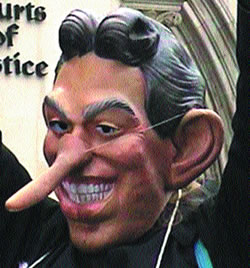 |  |
Even in mainstream kapitalist parliamentarianism, the question of whether ethics could ever be founded upon the pursuit of personal interests was once the source of ideological disputation. Now it's all about administration and ideological conflict has effectively been extirpated from kapitalist parliamentarian 'debate' (to make ideology itself function all the better, of course), the once shocking notion that pursuing one's own interests is ethical, indeed is the only way to behave ethically, has now been normalised. (A telling element of guilt is perhaps evident in the now customary appeal to 'you AND your family', as if pursuing the interests of 'your family' was somehow more noble, or indeed different from, pursuing your own interests.) The assumption is the familiar Adam Smith fairy story that all will benefit if everyone pursues their own interests. Once, the Smithian idea that good would spontaneously emerge as an ephiphenomal side-effect of an aggregation of individual interestedness, used to be opposed to the concept of a collective Good, but that possibility has disappeared - or been disappeared - from popular political ontology.
Now, in fact, it is considered wrong not to pursue your own interests. In political struggles at work, for instance, my 'sin' seems to consist in my negligecting to protect my own interests (defined of course in purely economic-careerist terms) adequately. Cynical subordination to central government stupidity and to managerialist vacuousness can be defended on no other grounds except personal pragmatism, of course. The familiar Zizekian ideological capture kicks in: 'Don't believe in it (education reduced to a propaganda tool in Blair's re-election strategy, Stalinist quotas for educational achievement, etc etc), just do it.'
That's why what I have called innocynicism is the alternative to rationalist enthusiasm (perhaps 'enthusiasm' is a better term than 'fanaticism', for all sorts of reasons). It's never a case of religion versus secularism, but religion versus hidden religious commitments. Always ask: who is their god? For secularists it's usually the big Other or Oedipus, or both.
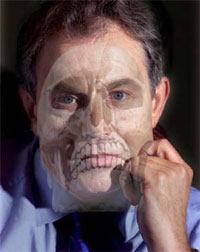
This post, also on Lenin's Tomb - in which TB is brilliantly and briskly rushed through Baudrillard's three orders of simulacra - is one of the best analyses of innocynicism I've seen. The glorious Private Eye television review disection of the Pope death referred to by I.T. rightly draws attention to the media's suspension of the habitual hyper-sceptical mode they employ when faced with even the most modest of claims by politicians in favour of supine, slack-jawed piety when confronted with the ludicrous superstitious blather of the Papists. But Blair seems to embody both these stances always, and at one and the same time. Total cynicism, total pietism. The second service Blair has done us is to expose the identity of these two positions.
The first, naturally, was to completely and definitively undermine any residual faith in Kapitalist parliamentarianism.
April 16, 2005
Why K?

Well, I'm still enough of a neophyte to be thrilled by a mention in Village Voice. I suppose it is ironic that Geeta describes k-punk as 'cultural studies', given my notorious antipathy to cult studs. On the other hand, though, k-punk is cultural studies as I'd always thought it should be practised (much of my hostility to cult studs stems from a disappointment when faced with the depressing, guilt-mongering reality of cultural studies in the academy).
Any way, here is the full text that I sent to Geeta:
1. Why I started the blog? Because it seemed like a space - the only space - in which to maintain a kind of discourse that had started in the music press and the art schools, but which had all but died out, with what I think are appalling cultural and political consequences . My interest in theory was almost entirely inspired by writers like Ian Penman and Simon, so there has always been an intense connection between theory and pop/ film for me. No sob stories, but for someone from my background it's difficult to see where else that interest would have come from.
2. Because of that, my relation to the academy has always been uh difficult. The way in which I understood theory - primarily through popular culture - is generally detested in universities. Most dealings with the academy have been literally - clinically - depressing.
3. The Ccru as an entity was developed in hostile conditions as a kind of conduit for continuing trade between popular culture and theory. The whole pulp theory/ theory-fiction thing was/ is a way of doing theory through, not 'on', pop cultural forms. Nick Land was the key figure here, in that it was he who was able to hold, for a while, a position 'within' a university philosophy department whilst dedicatedly opening up connections to the outside. Kodwo Eshun is key as someone making connections the other way - from popular culture INTO abstruse theory. But what we all concurred upon was that something like jungle was already intensely theoretical; it didn't require academics to judge it or pontificate upon it - the role of a theorist was as an intensifier.
3. The term k-punk came out of Ccru. 'k' was used as a libidinally preferable substitution for the California/ Wired captured 'cyber' (the word cybernetics having its origins in the Greek, Kuber). Ccru understood cyberpunk not as a (once trendy) literary genre, but as a distributive cultural tendency facilitated by new technologies. In the same way, 'punk' doesn't designate a particular musical genre, but a confluence outside legitimate(d) space: fanzines were more significant than the music in that they allowed and produced a whole other mode of contagious activity which destroyed the need for centralized control.
4. The development of cheap and readily available sound production software, the web, blogs means there is an unprecedented punk infrasctructure available. All that is lacking is the will, the belief that what can happen in something that does not have authorisation/ legitimation can be as important - more important - than what comes through official channels.
5. In terms of will, there has been an enormous retrenchment since 1970s punk. The availability of the means of production has seemed to go alongside a compensatory reassertion of Spectacular power.
6. To return to the academy: universities have either totally excluded or at least marginalized not only anyone connected with Ccru but also many who were at Warwick. Steve 'Hyperdub' Goodman and Luciana Parisi are both Ccru agents who have managed, against the odds, to secure a position within universities. But most of us have been forced into positions outside the university. Perhaps as a result of not being incorporated ('bought off'), many in the Warwick rhizome have maintained an intense connection and robust independence. Much of the current theoretical drift on k-punk has been developed via a collaboration with Nina Power, Alberto Toscano and Ray Brassier (co-organizer of the NoiseTheoryNoise conference at Middlesex University last year). The growing popularity of philosophers like Zizek and Badiou means there is now an unexpected if rogue and fugitive line of support within the academy.
7. I teach Philosophy, Religious Studies and Critical Thinking at Orpington College. It is a Further Education college, which means that its primary intake is 16-19 year olds. This is difficult and challenging work, but the students are in the main excellent, and far more willing to enter into discussion than undergraduates. So I don't at all regard this position as secondary or lesser than a 'proper' academic post.
April 14, 2005
NECROPOLIS NOW

londonunderlondon, very kindly described by Autonomicforthepeople as ' like a beautiful dark dream. Abandoned underground tunnels, troglodytes, fleeting Drumz churning , shy animals, ethereal grime...' was broadcast on April 4th on Resonance FM. The mp3 is now available from the Resonance website but due to my lo-fi radio-hostile mix much of the detail got lost when it was broadcast, so I'd recommend anyone who wants to hear it to get the original waves from me. I'm gradually posting out CDs to the Dissensus kru who requested em; any k-punk readers who would like a copy should mail me and it will be provided.
londonunderlondon, ruff-mixed as it is, needs to be seen as a work in progress. Naturally, it isn't anything like equal to its inspirations - which number anything from Glenn Gould's The Idea of North, Chris Marker, Eno, David Toop - but what became clear to us as we produced it was how little punk will there is. The cyberpunk infrastructure is already there. Something like Cool Edit - an excellent programme btw - reduces sound composition to the core cyberpunk function of cut and paste. Yet the main use to which is put is to produce 'music' (or, worse, insufferable 'sound art') - what about all those interzones between music, fiction, drama, documentary, a DJ set? What is lacking is the will to explore such terrains.
Czukay suggests that we should reveal all the sound sources etc. I'm willing to do that in the end, but I'd like a few more people to hear it first. To provide a list of all the samples at the moment would be like presenting diners with a list of ingredients before they've eaten the meal. In the meantime, I present below the text I produced for the section we came to call Necropolis Now:
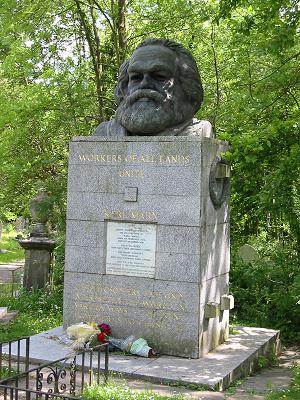
'Vampires may start out in Rumania or Egypt, but they always end up in London.
Marx saw that, as, in the gaslit setting of the British Library, he laboured tirelessly on his interminable steampunk survey of the body of SF Kapital. 'Capital is dead labor, which, vampire-like, lives only by sucking living labor, and lives the more, the more labor it sucks'. The task Marx sets himself is no less than to diagnose and cure a planetary geotrauma that began in London five hundred years ago.
Apocalypse is always now, and Marx is trying to cut his way out of the pre-sent. If he can't break the time lines, the future will be nothing but more of the same. The endless end, global subordination to Kapital's idiot cyber-Telos. 'Time is everything, man is nothing: he is at the most time's carcass.'
Marx writes from the very epicentre of the ongoing catastrophe, the site where the Kapital Artificial Intelligence-Parasite, made up 'of numerous mechanical and intellectual organs', first crash landed on earth. Since then, using the factory-farmed population of the city to provide the 'mere conscious linkages' it lacks, Kapital has itself become the solution to the perennial problem all Gothic entities face: how does what has never been alive reproduce?
It uses your eyes and ears, your fingers, your brain....
'By virtue of it being value, [Kapital] has acquired the occult ability to add value to itself. It brings forth living offspring, or, at the least, lays golden eggs'.
Approach from West India Quay and see what corpses have sprouted on the Isle of the Dead....
Barclays – HSBC – Bank of America – Citigroup -
Kapital mausoleums, freezer-white canyons of Finance ICE, pointing like rigor mortis fingers into the greyish purple of the light-polluted helicopter sky. Necropolitical take-over of the docks, both functionally and spatially. No need for ships to provide global communications now.
(I had not thought that death had undone so many).
Virtual Ground Zero. If they struck surely it would be here…..
Here, where everything is already dead…
In Cabot Square, descend through the mock deco hallways into the migraine hyperbright no-wonderland of the retail arcades.
The eternal noon of the living dead.
And Saturday night in the City is always dead. The high rise reptiles have slunk back to their lairs.
Finance vampires hunt by day.
And I too have been one of the dead. Duplicates have used my name while the alien parasite entity squats behind my eyes. (Marks of weakness, Marks of woe.)
Down into the tube, hanging like a slab of Bacon in the zombie meat trucks.
(A crowd flowed over London Bridge...)
The underground is the stalking zone of shambling automata.
You know this in your dreams, and in what London dreams, in the fictions it breeds. That is why the London flood barrier against the Real has had a spectacular record of failure. They were looking in the wrong places. The incursion has already happened, many times.
Fictions about invasion are already invasions.
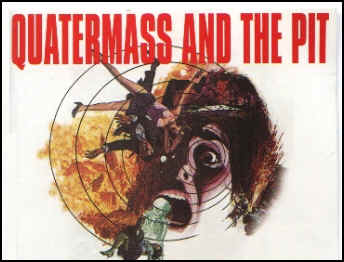
As he completes Moses and Monotheism in exile in Hampstead, Freud can see what Nigel Kneale can later see: What you inherit from your parents is death.
You come to be in a mortifying structure that precedes you. You only have a lifetime to escape.
In the London Underground, Quatermass unearths parasites far more ancient than any Marx described. Kneale poses the same question as Wells, but differently:Will earth become the second dead planet of the martians?
For Wells, the Martians that invade London from Surrey-side are extra-terrestrial pirates giving the British imperium a taste of its own medicine.
But Professor Quatermass the metapsychologist can see that there was no human life that preceded the arrival of the myrmidons of death. The discovery he makes in Hobbs End is archaeopyschic horror: human beings were only ever the carrier-bodies for the alien death drive. There is no inside, and everything in your dream home is already owned by the parasites.
That is why it isn't only traumatic fixation that compels Londoners to keep dreaming of invasion. Something else getting in would also be something in you getting out. Destruction of the World is also flight from the strata, from the catacomb of home, tomb of the cybermen...
The TV orphans whose electronic spines tingled to Delia Derbyshire's Dr Who theme knew this as soon as they heard it in 1963. The uncanny is always the untimely. Delia Derbyshire is no more bound to her own time than Marx or Quatermass were denizen of theirs. On the contrary, cutting up present time in the Radiophonic Workshop's lab in Maida Vale, she is a nomad of the time streams.
'She used concrete sources and sine- and square-wave oscillators, tuning the results, filtering and treating, cutting so that the joins were seamless, combining sound on individual tape recorders, re-recording the results, and repeating the process, over and over again.’
Television was the uhomely vortex around which the 1960s British domestic scene was organized, the chinese box display unit opening out the so-called interior onto the media landscape. The wired kids who watched, entranced, had consumed the Cuban Missile Crisis and the Bay of Pigs with their breastmilk.
They know that terror is the name for the new, and they hear in Derbyshire's sonic construction - broadcast for the first time the day after Kennedy's exploding head had inaugurated the sixties' atrocity exhibition - a presentiment of the decade's megaviolence.
But they hear something else in the Radiophonic Workshop's Audio Uncanny, which, never centre-stage in the rock Spectacle, nevertheless quickly becomes unobtrusively ubiquitious.
An alternative Now builds itself out of radio station idents and incidental music. Ear worms breed the hunger for a space in which they can propagate, out beyond the pleasure principle, on the strobing plateaus of the dancefloor....'
April 09, 2005
Is it easier to imagine the end of the world than the end of capitalism?
Well, I must say that the second and third adventures have been quite delightful.
If 'Rose' had all the features of a Dr Who episode I should have loved, 'The End of the World' had all the Fantasy trappings I instinctively dislike - spaceships, blue-coloured aliens etc - but Russell T Davies' script was so witty and thoughtful that any misgivings were swept away from the first minute. Davies showed once again that it is possible to send up SF conventions without ending up in PoMo irony: queering rather than queening you might say.
The template for 'The End of the World' was clearly 1972's 'Curse of Peladon', in which Pertwee encountered a menagerie of aliens convening on a medieval planet for an inter-species conference. The allusion in 1972 was to the UK entry into the EEC; Davies' target in 2005 was consumerism, celebrity and cosmetic surgery. Bat emailed me with some fascinating analysis:
'the plot basically involves the world ending, with the "great and the good" - ie filthy rich - looking on [yes, it was like Nova Express crossed with The Society of the Spectacle - m k-p]. The future society is depicted as thoroughly hierarchical and deferential, and the murder mystery plot revolves around shares and money.
Which of course perfectly fits Zizek's pronouncement a couple of years ago that we find it easier to imagine the world ending than a change in the political system:
"In the last thirty years, we are again accepting the notion of history as fate. Thirty or forty years ago, there were still debates about what the future will be - Communism, socialism, fascism, liberal capitalism, totalitarian bureaucratic capitalism. The idea was that life would somehow go on on earth, but that there are different possibilities."
"Now we talk all the time about the end of the world, but it is much easier for us to imagine the end of the world than a small change in the political system. Life on earth maybe will end, but somehow capitalism will go on."'
Actually, I was reminded of Zizek's insistent refrain that, for a true philosopher, everything has already happened. Rose (Billie Piper quite superb again) in effect attains that philosophical wisdom during the episode. Davies managed to make the scene in which she talked to her mum across time with a mobile phone hastily 'jiggery-pokered' by the Doctor by turns funny, sad and genuinely philosophical. Rose in effect flips from immersion in 'lived duration' to the perspective of Eternity, which is to say, she attains a detachment from any particular pathological 'horizon'. She sees that not only her own organism, but her species and planet are ephemeral. All of which put me in mind of Lyotard's essay in The Inhuman 'Can Thought Go on without a Body?' and Ray's brilliant radicalization of it in his 'Solar Catastrophism'. As Ray writes:
'Lyotard’s question, ‘can thought go on without a body?’ ... [raises one that is] more fundamental, although it only warrants a passing mention by Lyotard. This other question is: can thought go on without a horizon? The use of the word ‘horizon’ here is intended to bear a quasi-transcendental charge. For European philosophy up to and including Nietzsche—I say ‘including’ because I fear Nietzsche ultimately remains a Christian thinker—the name for the horizon was ‘God’. Then, in the wake of the collapse of this first horizon, for a central strain in European philosophy since Nietzsche, whose most significant representatives include figures as diverse as Husserl, Heidegger and Deleuze, the name for the horizon becomes ‘Earth’. My aim here is to show that this horizon too needs to be wiped away.
Thus, the link between Lyotard’s question, “can thought go on without a body?”, and my question “can thought go on without a horizon?”, is provided by an intermediary question: “what happens to thought when the earth dies?”. Significantly, this is the question with which Lyotard’s essay begins. Roughly 4.5 billion years from now, Lyotard reminds us, the sun will explode, destroying the earth and all earthly life. Thought’s terrestrial horizon will be wiped away. This is the solar catastrophe, in the original Greek sense of the word as a ‘mis-turning’ or ‘over-turning’ (kata-strophe). The death of the sun is a catastrophe because it overturns the terrestrial horizon relative to which philosophical thought orients itself. Or as Lyotard himself puts it: “[E]verything’s dead already if this infinite reserve from which [philosophy] now draws energy to defer answers, if in short thought as quest, dies out with the sun.” Everything is dead already. The catastrophe has already happened. Solar death is catastrophic because it vitiates philosophical temporality, thought’s constitutive horizonal relation to the future. Far from lying in wait in for us in the far distant future, on the other side of the terrestrial horizon, the solar catastrophe needs to be grasped as the aboriginal trauma driving the history of terrestrial life and terrestrial philosophy as an elaborately circuitous detour from stellar death. Terrestrial history occurs between the simultaneous strophes of a death which is at once earlier than the birth of the first unicellular organism and later than the extinction of the last multi-cellular animal. Paraphrasing a remark Freud makes in Beyond the Pleasure Principle, we could say this: “In the last resort, what has left its mark on the development of [philosophy] must be the history of the earth we live in and of its relation to the sun.” This mark, this trace imprinted upon thought by its relation to the sun, is the trace of the solar catastrophe, which both precedes and follows, initiates and terminates, the possibility of philosophisable death.'
The 'excarnate thought' Ray posits at the end of the essay is as far from the 'lived body' hymmed by contemporary theory (the word 'body' almost invariably means 'organism' in such cult studs of course).
The philosophical import of the episode's revelation was literally unhomely, in that, although the Doctor asks Rose if she would like to go home, it is clear that there is no home for to go to, and never was. For Rose, indeed, Everything is dead already. When she and the Doctor return to earth, the bathetic note struck when they seek out a bag of chips does not dispell the uncanniness of the scene, in fact it underscores it: the people, the business, the crowds now look like ghosts of themselves, which of course they are. 'You only have a lifetime to escape', as I put it in londonunderlondon.
The Eccleston Doctor's bipolar lurching from impish playfulness to sullen melancholy was given a motivation that added to the thematic richness of this particular adventure, whilst setting up an intriguing story arc. The hints about a Galifreyan genocide ('There was a war. We lost') gave the Nietzschean theme of the Last Man another dimension. Both the Doctor and Rose have seen their worlds destroyed, both have experienced themselves as the 'last' of their people. And the challenge they both face - the Doctor dealing with it by such a passion for activity that he does not have time to be sucked into depressive pathos - is the one Nietzsche understood very well: to face the radical contingency/ ephemerality of all 'horizons' and yet remain committed, engaged. If, as Ray rightly argues, Nietzsche ultimately fails in this, it is nevertheless the very basis of Spinoza's Ethics.
The Doctor's line 'everything dies', and his allowing of the Dorian Gray-like Cassandra to disintegrate, like Poe's Waldemar, into long overdue death couldn't have been more timely, what with the Terri Schiavo nonsense...
(All this and Britney Spears too! (Though there is a possibility of a continuity error in the implied reference to a 'Toxic' 7" single release.)
Tonight's episode, 'The Unquiet Dead', written by League of Gentlemen's Who-enthusiast Mark Gatiss, was a return to the classic Gothic mode perfected during Philip Hinchcliffe's tenure on the programme in the late 70s. The story it most resembled though was one aired just after Hinchcliffe had left, Horror of Fang Rock - the same powerful use of a confined space (a Victorian morgue in 'The Unquiet Dead'; a lighthouse in 'Fang Rock'), the same Sapphire and Steel-like revelation that the apparently supernatural is in fact alien. It was not so much steampunk as gaspunk, the literally ethereal aliens taking advantage of the Victorians' method of lighting. Gatiss made excellent use of the period mummery, all the accoutrements of seances and mediums, and Simon Callow was suitably histrionic as the defeated and depressed older Dickens, reduced to performing the same old dramatic turns over and over again before being shaken out of his empiricst scepticism by an encounter with 'The Blue Elementals'.
Fabulous. (Btw I liked the description of Eccleston's Doctor as the Autistic Doctor on David Golding's Weblog, that seems to fit).
April 07, 2005
TWO LAST THINGS ON THE POPE
... a litany of the now actually dead Dead Father's crimes here (thanks to Simon who mentioned this in passing on Dissensus). I love that line from Graham Greene: 'John Paul to canonise Jesus Christ.' Heh heh...
.... and one observation prompted by seeing all those morons filing past the reactionary old man's corpse.... Show footage of something similar happening in North Korea or another communist regime and it is evidence that people have been 'brainwashed'; in the 'free' west, of course, exactly the same behaviour is evidence of an 'overwhleming tide of feeling'. In one of many Chris Morris moments, a Sky hack said that the idiots in the queue were extremely hot, 'though many would regard this small act of suffering as a fitting tribute to a Pope whose last years were so difficult'... Presumably the greater the suffering, the greater the tribute: in which case, the death and disease in Africa that the old bigot caused must be the greatest tribute of all.
Joker hysterical face
I suppose we shouldn't begrudge the middle classes the yards and yards of pointless newsprint and hours of tedious TV that will ensue over the next few weeks in the name of 'analysis' of their irrelevant Kapitalist Parliamentarian Spectacle...
After all, we get Big Brother every year, they have to wait four years for their version...
Speaking of Kapitalist Parliamentarianism, thanks to Czukay, my piece SF Capital is now up on the revamped Transmat site.
'For a chilling image of how SF Capital induces auto-zombification in the master class, you only have to look at the face of our glorious leader: that ashen carnival mask, its grim, cheerless Joker-grin flashing with ritual efficiency, its blank eyes illuminated by empty evangelism, darkened by perpetual irritation - the PM's being run by Videodrome… and no-one owns Death TV.'

April 06, 2005
NEUBAUTEN'S MESSTHETICS NOW
Einsturzende Neubauten's performance last night at the Forum in Kentish Town was an unequivocal triumph, as inspiring as the confederacy of idiocy surrounding the Pope's death has been depressing.

It's worth comparing Neubauten's trajectory to that of Scritti Politti (after all, who exemplifies 'messthetics' better than EN?) Neubauten are in many ways the last surviving group from the immediate postpunk era, but where Scritti have embraced the mainstream, with diminishing returns both sonically and commercially, Neubauten have defiantly avoided incorporation. To be honest, I lost contact with them after Haus der Luge, but if there was a trend towards less conspicuous experimentalism on their later recordings, there was no question, as with Scritti, of repudiation of the MO establised on their earliest work. Neubauten's joyful return to that material last night was at the other extreme from Green's sniffiness about the Early Scritti. A few years ago, Green's standoffishness might have sounded like the voice of mature 'realism', just as the idea of men in their forties still beating metal might have seemed 'sad'. Now, Green's disavowal of messthetics just looks like betrayal, and Neubauten's holding of the line fidelity.
Both groups began in peripheral zones of cultures still dominated by WWII. Scritti were holed up in a country that had limped on, its empire disintegrated, with a cultural and physical infrastructure defiantly unchanged in many important respects since 1945. Neubauten coalesced in a rebuilt West Germany that needed to be amnesiac about anything preceding 1945. In Britain, the power elite remained esconced in the rotting splendour of old buildings; in West Germany, they occupied new constructions. It was, therefore, new buildings that Neubauten would set out to collapse: not, naturally, to recover some ur-authenticity beneath or beyond the modern city, but to remind us that the cosmos can never stop being a building site.
Nowhere is the opposition between Modernism and Modernization more apparent than in Neubauten's messthetic. The temporality of Modernization is that of reproductive futurism: its vast pyramidal SF constructions are the very epitome of Gleamprog. Modernism, however, seeks to dismantle both future AND past to get to Now. That's why its locale is not the 'high tower' of SF, but the 'street' of cyberpunk, the zone where necessity is the mother of improvisation, where machinic pragmatics trump order and organization. What Neubauten were doing in Berlin, hip-hoppers were doing in New York: ignoring the aesthetic prescriptions demanded by 'music', and making it an open question as to how sonic intensities are produced, rewiring the city and reconstructing it as a Partch-work of little machines. The idealized musical object (deemed to be undecomposable because composed) is rematerialized as a set of potentials, machine parts to be recombined at will. What makes this matter, for Neubauten as for hip-hop (then if not now), is that the questions they pose are not academic; the proof of the pudding is in the beating, and Neubauten's sonic junk sculptures are sublimely compulsive. Listen, now, to their earliest recordings on the outstanding Strategies Against Architecture; they are far less 'difficult' than listening to the Stereophonics, honestly, in that they stimulate your nervous system rather than send it to sleep. These were genuine experiments --- things could do wrong, discoveries could be made. That's something far different from the safe refuge of Wire-feted Experimentalism, which is as generically hidebound and untroublingly predictable as boyband chartopop.
My opening contrast of Neubauten with the Pope is not idle rhetoric. Thomite Catholicism is based upon the Aristotlean conviction that the universe has been designed, and that each created thing in has a specific purpose. As Biba Kopf argued in his sleevenotes for Haus der Luge, what Neubauten dismantle is harmony at every level: organismic, social, cosmic. Musical harmony is theological and ideological: the image of a universe that has already been constructed, not of one still under construction.

There are still, gratifyingly, some people who want to see the World we're forced to live in collapsed. The crowd tonight - no surprises here - are almost all dressed in different shades of black; there's a refreshing paucity of moody teenage boys, and no baseball caps. Bargain! The atmosphere is highly congenial, and not only because of the density of Goth women, the last remnants of Glam's aristocracy. We all wait with a quiet expectancy. After the band have started, it takes me a while to realise that the usual London gig irritants - idiots pushing past to get to the bar or conducting conversations throughout - are absent. Everyone is itent.
The band take the stage and Blixa transfixes your attention already. The women swoon for him (including the Italian I'm standing next to, who looks like a Goth version of Sophia Loren [no, really...]), and rightly so. Kopf described him as the Berlin Dandy of the Apocalypse, a description that fits him better the older Blixa, resplendent in three piece suit and black nail varnish, now that he's lost the consumptive-anorexic thinness and DIY-hacked haircuts. He holds court easily, regaling us with anecdotes (including one about their former bass-player, Marc Chung, who, improbably, now holds a senior executive position in Sony Europe. When EN were between contracts, they approached Chung, who said, 'Well, maybe: send a demo.')
They start the first of two retrospective sets with 'Yu Gung', and Bargeld is immediately Duchamp-transformed from handsome raconteur into an Artaud-howling scream-machine, his trademark vocal tic, that atonal screech - which sounds halfway between electronic feedback and a dog yelp - magnificently offset by the metallic swarming of the backing track. The physicality of the sound is something that can only be experienced live: for all their power, the records are mere fading coals of the stage inferno.
Perfomance is about the capacity to entrance by entering into a trance. It is good to be reminded in the era of Robbie and (still!) Bono, that no amount of posturing and meta-mugging can substitute for that. Neubauten have two trance modes: metallic-rhythmic and suspenseful-droning. Andrew Unruh's punitive-addictive rhythmic pulse is crucial to the first. He is a cheerful rhythm-technician, rightly delighting in what his beatmachines can produce. What is notable about alll the band, in fact, is their eminent lack of portentousness. The black clothes are not the pantomime dress beloved of generic Goth-Industrialists, they are a neutral canvas, a wiping away of the postmodern world's excessive brightness.
This is Pop with only the vaguest relationship to rock, a Pop which has its roots in Stockhausen rather than Presley, Duchamp rather than Robert Johnson. And why not? The very early material makes its own case more powerfully than ever, electrifying the crowd. If 'O Superman' could top the charts, why not the tense astropop of 'Kalte Sterne'? Mid-eighties tracks like 'Sehnsucht' and 'ZNS' (the latter played live for the first time on this tour) possess a suffocating intensity that makes my teeth grit, my knees weak. Of course you can dance to them.
Reproductive futurists want to build homes for the future.
We've been inside, we don't like it.
We want production spaces, not domestic show homes.
Sparks flew, and not only literally.
April 05, 2005
MORALITY IS THE MORALITY OF THE OTHER
But, as I argue over at Dissensus, the Pope Pietathon is not, of course, a symptom of resurgent Catholicism (uttunul forbid!), but quite the opposite. The reason that the future head of the Church of England and the current archbishop of Canterbury can cheerfully attend John Paul's funeral is not only the evident and well-known vacuity and spinelessness of the C of E, but also because Catholicism within white Europe has been thoroughly secularised. Being a white Catholic in Europe is now no more than a slightly sexy lifestyle choice, not a life commitment (Jesus, that's too much to ask of anyone surely... ) This is secularism's revenge upon Wojtyla, who, for all his (many) faults, at least had the virtue of bending not a jot to pomo's compulsory relativism.
cf the soon-come Catholic convert Toneeeeee, who of course simply MUST attend the Spectacle - how could he miss the [photo] opportunity to button and unbutton his jacket buttons and look determinedly grave in that carefully cultivated manner he perfected on the morning of the Diana death, whose hysterical sentimental excess has set so much of the religiose, kneejerk pieitist tone that is now de rigeur in Blair's innocynical Britain?
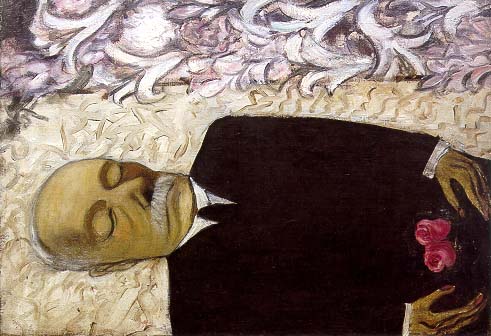
The contentlessness of this pietism is what makes it fit so well with the inherent and constitutive cynicism of Capital. You are not required to make a substantive commitment to definable ethical principles, only to pledge misty-eyed submission to a thoughtless, vaguely-defined consensus, whose lineaments only become apparent when scapegoats are deemed to have exceeded them ('ye have insulted the Dead! Burn, witch!') Postmodern capitalism has replaced the religious distinction between the sacred and the profane with the apparent opposition between solemn sim-seriousness (in which everything is so impossibly grave and beyond question that absolutely no levity or dissent is allowed WHATSOEVER) and leering laissez-faire lassitude and lasciviousness (c'mon, let your hair down, don't be so serious, ENJOY yourself, be sick on your shoes, don't pretend you don't want to).
Hacks on Celebrity Death Watch described Wojtyla as an 'inspring moral leader' not because there is any question of them, cynical to the bone, being inspired by him. They, naturally, won't be practising anything that Wojtyla preached - I don't imagine that many of them have thought for a moment about ceasing to use contraception or opposing abortion. Wojtyla, like the other figures canonized by postmodern media, is lauded by secularists because he was moral on our behalf. In postmodernity, morality, like belief, is always of the other.
___________________________________________________________________
Another interesting site for y'all: Jason Adams'
Immanent Multiplicty covers Foucault, Zizek, Badiou, Deleuze, all under the rubric of breaking 'the isolation of the academic matrix' - a genuinely noble ambition, which I'm sure we all want to support.
April 02, 2005
Piety and cynicism
Can I remind the BBC that the UK is a Protestant country?
Is it me or has this pathosathon, occasioned by the demise of an evil old bigot and protector of child abusers (4000 priests indicted in America alone and counting), out-indulge even the Diana delirium? (I can't even imagine scenes this maudlin in Liverpool, world capital of self-pity, the last time someone connected with that city died...) The current parade of faux-piety is so disgustingly excessive that I'm shouting at the screen, please, please, this HAS to be a Chris Morris parody.... The Sky News coverage has been gloriously reminiscent of that live-link up to the Michael Heseltine pacemaker thing... All other news reduced to a 20-second blitz every hour, as the alcohol-pickled hacks, brandishing their well-practised po-faces (solemnity factor 100), wait, slavering, for the announcement of The Death...
This is NOT the news.... The man has been a brain dead vegetable for the last two decades, and he has been the propagator of idiot organo-vitalist brain dead ideas all his life... There is NOTHING to see here.... How many people died in Africa today, unmourned by 'the world', as a direct consequence of the RCC's bio-nazism? Make more organisms like yourself... as many as possible... and if you use your body for any other purpose, it's a SIN...
How can anyone with any intellectual integrity defend this pagan cult of personality when its infantilising mystico-goo - suspend all rational thought all ye who enter through the gilded gates of the Vatican - is lathered all over videodrome so copiously just now?
Naked political propaganda ... 'John Paul inspired a revolution'... Yes, everyone in pre-Glasnost Poland was a hard-done-to Catholic (Catholicism NEVER being implicated in any geo-political atrocity, no, it never burned witches, there never was an inquisition, there was no collaboration with Nazis...) waiting to be 'liberated' by a resurgent fertility cult. NO-ONE in Poland wanted Communism, ever... They've been celebrating every day since 1989, honest, every one of them....
But, but, didn't John Paul 'criticise capitalism' too? Yes, well, it's the sort of criticism captalism can live with and indeed happily solicits... make it all a question of individual morality, not structures... if only people were less greedy... And of course, that criticism will really bite when it issues from someone sitting amidst the most preposterous display of wealth on the planet, most of it expropriated from the poor and the helpless, whose reproduction as sweatshop fodder the RCC so generously encourages...
Why are we endlessly told that we 'fought a war against' Nazism - 'we' didn't of course, Britain fought a territorial war against Germany - but it is conveniently forgotten that England struggled against centralized Catholic power for centuries?
And no, no, this is not a rant... simply a statement of facts at a time in which you might be blinded by the crocodile tears and sim-sentimentality of media-moronism at its most pathological....
